|
|
|
ADVERTISEMENTS
|
|
PREMIUM
- HAPPY HOLIDAYS!
- Siliconeer Mobile App - Download Now
- Siliconeer - Multimedia Magazine - email-Subscription
- Avex Funding: Home Loans
- Comcast Xfinity Triple Play Voice - Internet - TV
- AKSHAY PATRA - Bay Area Event - Sat. Dec 6
- Calcoast Mortgage - Home Loans
- New Homes in Silicon Valley: City Ventures - Loden Place - Morgan Hill
- Bombay to Goa Restaurant, Sunnyvale
- Buying, Sellling Real Estate in Fremont, SF Bay Area, CA - Happy Living 4U - Realtor Ashok K. Gupta & Vijay Shah
- Sunnyvale Hindu Temple: December Events
- ARYA Global Cuisine, Cupertino - New Year's Eve Party - Belly Dancing and more
- Bhindi Jewellers - ROLEX
- Dadi Pariwar USA Foundation - Chappan Bhog - Sunnyvale Temple - Nov 16, 2014 - 1 PM
- India Chaat Cuisine, Sunnyvale
- Matrix Insurance Agency: Obamacare - New Healthcare Insurance Policies, Visitors Insurance and more
- New India Bazar: Groceries: Special Sale
- The Chugh Firm - Attorneys and CPAs
- California Temple Schedules
- Christ Church of India - Mela - Bharath to the Bay
- Taste of India - Fremont
- MILAN Indian Cuisine & Milan Sweet Center, Milpitas
- Shiva's Restaurant, Mountain View
- Indian Holiday Options: Vacation in India
- Sakoon Restaurant, Mountain View
- Bombay Garden Restaurants, SF Bay Area
- Law Offices of Mahesh Bajoria - Labor Law
- Sri Venkatesh Bhavan - Pleasanton - South Indian Food
- Alam Accountancy Corporation - Business & Tax Services
- Chaat Paradise, Mountain View & Fremont
- Chaat House, Fremont & Sunnyvale
- Balaji Temple - December Events
- God's Love
- Kids Castle, Newark Fremont: NEW COUPONS
- Pani Puri Company, Santa Clara
- Pandit Parashar (Astrologer)
- Acharya Krishna Kumar Pandey
- Astrologer Mahendra Swamy
- Raj Palace, San Jose: Six Dollars - 10 Samosas
CLASSIFIEDS
MULTIMEDIA VIDEO
|
|
|
|
|
NEWS DIARY | FEBRUARY:
India Faces a Big Population Challenge | Boss Faces Call-Center Death Case | Bird Flu Hits | Protests in Pak | Fuel Prices Go Up | Romancing India | Bomb Hits Bus | Maoists Bullish
India Faces a Big Population Challenge
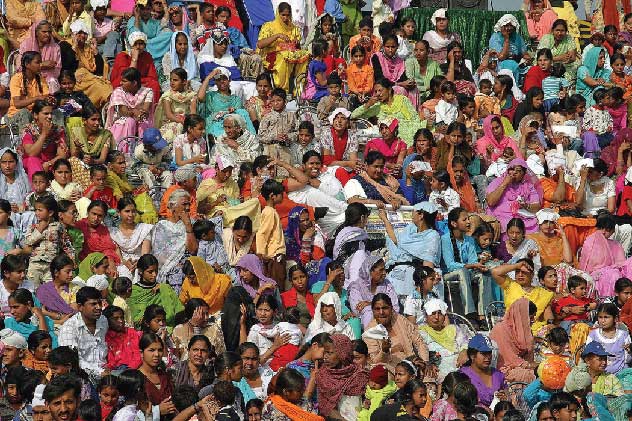
India’s population will be 1.6 billion in 2050.
India’s population has soared largely due to people living longer. It is already the world’s second most populated country with over 1.1 billion people, not far behind China which has 1.3 billion.
But China’s population is expected to level off in the coming decades because of the government’s one-child per family policy.
India’s population will keep on rising and the UN expects it to reach around 1.6 billion by 2050, by which time it will have overtaken China to become the world’s most populated country.
The rises in population in India have largely been caused by people living longer.
In 1947, when India became independent from British rule, average life expectancy was just 33 years. Improved living standards and healthcare have raised that figure to the mid-60s.
At the same time birth rates have been falling. But the reduction has not been fast enough to prevent the overall population rising rapidly. And it is often the poorest families which have the most children.
Will the country be able to cope with another 500 million citizens by the middle of the century? There will certainly be difficulties, according to Professor Tim Dyson, co-author of Twenty-first Century India. One of the biggest challenges will be the supply of water.
Agriculture uses most of India’s fresh water. If India is to feed a population of 1.6 billion it will need to dramatically increase its agricultural production.
But there will be no more available fresh water in 2050 than there is now. Indeed there may be less because of the effects of industrial pollution.
|TOP|
Boss Faces Call-Center Death Case
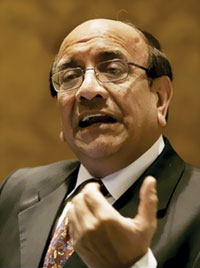 Som Mittal Som Mittal
The boss of a call-centre worker who was raped and murdered on her way home from work in India is to be prosecuted for providing insufficient security.
Som Mittal was managing director of Hewlett-Packard GlobalSoft in 2005 when Pratibha Srikanth Murthy was killed.
She was being driven home after her night-shift in Bangalore when the driver of her company taxi raped and murdered her, according to police.
The Supreme Court has rejected a challenge to the charges being brought.
The Karnataka government, of which Bangalore is the capital, is bringing the case under laws that require certain businesses to provide safe transport for female employees traveling to and from the office at night.
Mittal is now the president of the National Association of Software and Services Companies, which is the main industry body for India’s outsourcing industry.
Nasscom itself helped draw up guidelines saying that guards should accompany drivers in company taxis and that female employees should not be the first picked up or the last dropped off.
If found guilty, Mittal would face a fine of 1,000 rupees and would also get a criminal record.
But there has been great interest in the case in India, where about 700,000 people are employed in call-centers, about 40 percent of whom are women.
|TOP|
Bird Flu Hits
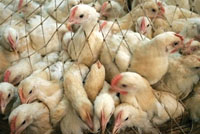 Chickens in a Dhaka market. Chickens in a Dhaka market.
Two more districts in central Bangladesh have been hit by bird flu, the government said Feb. 24, as the nation nears its third month of trying to control an outbreak of the virus among poultry.
The deadly H5N1 strain was reported in central Munshiganj and Chandpur districts in the past two days, taking the number of affected districts to 45 since January, an official with the government’s bird flu monitoring office said.
He added that nearly one million birds have been slaughtered since the latest outbreak began.
But government spokesman Salahuddin Khan said the situation was under control because fewer farms had been affected following a massive cull.
Before “an average six to seven farms were affected (daily) by the bird flu. Now this week the number has declined to an average of two farms a day,” he said.
Bangladesh was first hit by bird flu in February 2007 but the disease became dormant. Officials said it resurfaced in January when 20 new districts were hit. So far in February another 13 have reported cases.
Bangladesh’s poultry industry is one of the world’s largest, producing 220 million chickens and 37 million ducks annually.
Last week industry officials said the spread of bird flu had led to the closure of 40 percent of the nation’s poultry farms and left half a million workers jobless.
|TOP|
Protests in Pak
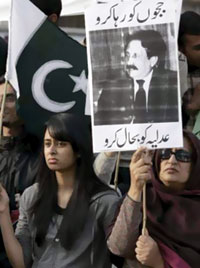 A woman holds a picture of Iftikhar Chaudhry during an anti-government rally in Islamabad. A woman holds a picture of Iftikhar Chaudhry during an anti-government rally in Islamabad.
Days after opposition parties triumphed in elections, lawyers chanting for President Pervez Musharraf’s resignation were tugging at the barricades around the home of the judge whose ouster and house arrest helped trigger Pakistan’s political crisis.
The newly elected leaders are already under pressure to reinstate Chief Justice Iftikhar Mohammed Chaudhry and his fellow sacked judges on the Supreme Court. It’s one of several urgent issues that will determine the future not only of the U.S.-backed president, but also of a new government’s effort to rebuild the country’s battered democracy.
“Restoring the judges would put a bomb under Musharraf,” said Nazir Naji, a commentator for Jang, Pakistan’s top-selling newspaper. “He cannot afford to let this happen.”
Voters delivered a thumping defeat to Musharraf’s allies in the parliamentary election, and enabled the victorious parties of slain opposition leader Benazir Bhutto and another former prime minister, Nawaz Sharif, to announce that they would work together in a new government.
They owe much of their success to public anger at Musharraf’s crackdown on the judiciary. But they are divided on whether to re-seat the judges. Sharif wants it to happen quickly. Asif Ali Zardari, Bhutto’s widower and political successor, sounds cautious.
“Serious disagreement on this would be a real danger to the coalition,” said political commentator Shafqat Mahmood. “It is a make-or-break issue.”
Yet bringing back axed judges would set up an ugly confrontation with Musharraf and plunge the country back into political turmoil.
The former army strongman, who has resisted calls to resign as president, suspended the independent-minded Chaudhry March 9 last year on charges of misconduct.
The move backfired spectacularly, sparking furious protests from lawyers and a snowballing pro-democracy movement, eight years after Musharraf ousted Sharif in a 1999 coup.
|TOP|
Fuel Prices Go Up
 An Indian gas station An Indian gas station
India has raised the prices of gasoline and diesel for the first time in 20 months, reports the BBC.
The cost of gas will increase by 2 rupees ($0.05), or 4.6 percent per liter, and diesel will rise by 1 rupee or 3.3 percent.
India spends billions of dollars subsidizing fuel and the government has been reluctant to increase the price as the subsidies help keep down inflation.
Indian motorists enjoy some of the cheapest fuel in the world.
Motorists like Dina Vyas are not pleased about the latest increases.
She has been riding her motorbike in India for two decades now and has depended on the low cost of petrol.
“It will be very, very difficult. Other things will go up too — like rickshaws, buses, taxis because of these higher petrol prices.”
“It really is going to be very hard for us to bear this cost,” she said.
But the decision to raise fuel prices has been welcomed by Indian oil companies.
They have not been allowed to pass on high oil costs to customers and as a result are losing around $50 million a day.
“It is a good thing, its also logical,” said Ravi Shinde, head of the Indian Petrol Dealers Association in Maharashtra.
He said that oil companies, “can not go on buying the oil at a higher cost and selling at a lower cost — that’s not logical.”
But low fuel prices are what millions of Indians, especially those who have been left out of the economic boom, count on.
With the government facing elections in a dozen states this year — the decision to hike the cost of fuel is a brave one.
|TOP|
Romancing India
 Mills and Boon romances present unrealistic heroes. Mills and Boon romances present unrealistic heroes.
The famed publishers of romantic fiction, Mills and Boon, who launched in India recently, hopes that its amorous storylines will eventually seduce the country and become their biggest market, reports the BBC.
So what does an all-female reading group in Delhi think of romantic novels where the dark and brooding hero almost invariably ends up wooing and winning the fair maiden?
The women of a reading group in the capital have a common passion for romance.
For Seema Monhot, the main appeal is the “feel good factor” of a romantic novel.
“I like happy endings,” she said.
“Romance, for a girl, is an ongoing thing until the day you die. It doesn’t matter what age you are, you still want every bit of the romance that you experienced the first time you met your boyfriend, fiancé, or loved one. That’s the way I look at it.”
Although Mills and Boon — which has nearly three-quarters of the romantic market in its home country of the U.K. — is only now launching in India, their books are already popular in the country because they have been unofficially introduced from abroad.
Reading groups members acknowledge the stories are fanciful
Rachana Srivastava, for example, says that she grew up on a “staple diet” of the publisher’s works, which have molded her perception of the ideal man.
“I always imagined a knight in shining armor having vineyards and being tall, dark and handsome, coming and waking me up in my sleep and carrying me away somewhere,” she said.
“It has always been like that for me.”
|TOP|
Bomb Hits Bus
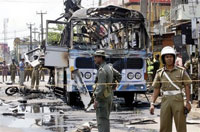 Soldiers stand guard near the wreckage of a bus, destroyed by a bomb in Colombo. Soldiers stand guard near the wreckage of a bus, destroyed by a bomb in Colombo.
A bomb exploded inside a bus near Colombo, injuring at least two people, according to Sri Lankan police.
Police said they suspected Tamil Tiger rebels in the attack, which happened in Mount Lavinia, a suburb of the Sri Lankan capital.
Sri Lanka has been in turmoil for the past several years, despite a Norwegian-brokered truce reached in 2002. On Jan. 16, the government formally withdrew from the cease-fire with the separatist group.
In the first six weeks of 2008, the conflict has claimed more than 180 civilian lives — an average of 30 a week, International Committee of the Red Cross said in a report last week. Another 270 people were injured.
The casualties have come from a wave of attacks on buses, train stations and other public places that the government has blamed the Tamil Tiger rebels of carrying out.
The fighting in Sri Lanka pits government forces in a country dominated by the Sinhalese ethnic group against rebels from the Tamil minority. The rebels are fighting for the creation of an independent nation, citing discrimination by the Sinhalese.
|TOP|
Maoists Bullish
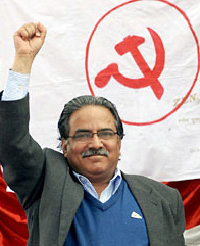 Nepal Maoist leader Prachanda Nepal Maoist leader Prachanda
Nepal’s Maoist leader Prachanda believes Maoists will lead the upcoming elections and he expects to be the first president of the country after its monarchy is abolished.
Prachanda told the BBC that King Gyanendra would probably be allowed to stay in Nepal after losing his title.
The ruling coalition says the monarchy will be abolished later this year.
The Maoists signed a landmark peace deal with the government in November 2006, declaring an end to their decade-old insurgency.
During the interview, Prachanda also refused to rule out the possibility the Maoists might take up arms again.
This April, Nepalis are due to elect an assembly to write a new constitution. Prachanda said his travels round the country had convinced him that his Maoist party would come top.
Prachanda said King Gyanendra’s fate would depend on his actions. “If he follows the decision of the masses of peoples according to the constitution, if he abides by the constitution, then our people will pardon him to stay here as a common citizen. There is not a problem,” he said.
The Maoists’ actions since coming into parliament and the cabinet in the past 13 months do not seem to have won them many friends.
In particular their huge youth league, the successor to their war-time militia, is regularly accused of extortion and thuggery.
But Prachanda said accounts of such behavior were exaggerated.
He said his party would accept the election result even if it did badly.
But he said it was possible the Maoists might take up arms again if any section of society, such as the army, tried “to conspire against the peace process.”
He added, however, that they wouldn’t wage war from the countryside; rather, violence might arise in the streets of cities.
|TOP|
|
|
|
|
|
|